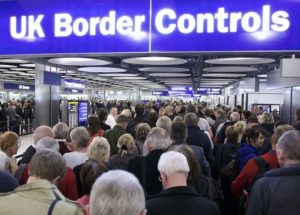UK migration hits record high
New figures show the UK’s net migration reached a record 606,000 in 2022 despite Brexit and a decade of successive Conservative government pledging to reduce migration
The figures, from Britain’s Office for National Statistics (ONS), showed more people from outside the EU arriving on student and work visas, as well as high numbers of people arriving under the Ukraine and Hong Kong settlement schemes.
 The ONS data shows an estimated 1.2 million people arrived in the UK, while 557,000 left in the same period. The 606,000 figure is up from 164,000 in 2021.
The ONS data shows an estimated 1.2 million people arrived in the UK, while 557,000 left in the same period. The 606,000 figure is up from 164,000 in 2021.
The ONS said that of the 925,000 non-EU nationals who came to the UK in 2022, almost 40 per cent arrived on student visas – but it added that students “typically” don’t stay long term, and the majority leave when their courses end.
The second biggest driver of the 2022 increase was the number of work-related arrivals from outside the EU, which nearly doubled from 137,000 to 235,000 in the space of a year, the ONS said.
“Net migration continues to increase despite Brexit: more EU nationals left the UK last year (202,000) than arrived (151,000),” the agency said.
Resettlement schemes triggered by what the ONS called “unprecedented world events” were the third biggest driver of the increase.
The number of non-EU nationals who arrived in the UK via humanitarian routes rose from 9 per cent to 19 per cent in 2022.
Among them were 114,000 Ukrainians, and 52,000 Hong Kong citizens who were offered a special visa scheme created after China imposed a national security law in the former British colony.
But the UK’s Prime Minister Rishi Sunak has said that migration was not out of control.
Under then Conservative Prime Minister David Cameron, the Conservatives pledged to get net migration below 100,000, and the party’s 2019 manifesto also committed to getting the rate down, without setting a specific target.
Mr Sunak said measures to tighten visa rules for overseas students recently put in place would bring migration levels down.
But a group representing many of the UK’s top universities, has raised concerns that the plans will impact their ability to attract income that international students inject into the British higher education system.
The Labour opposition home secretary Yvette Cooper said support given to Ukrainians and people from Hong Kong had unusually inflated the figures.
“Net migration is more than twice the level ministers were aiming for, and the asylum backlog is at a record high despite Rishi Sunak promising to clear it this year,” she said.
Ms Cooper also criticised the government for failing to tackle skills shortages, especially in health and social care, or to get people back into work after the pandemic.












